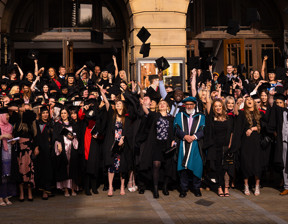Entry Requirements
Minimum of 48 UCAS points.
Completion of at least a Level 3 in Counselling if you don't have significant relevant experience and knowledge.
Study Mode
Full time
Duration
Full time:
2 years
Timetable
Various
Key Features & Benefits
- Validated by UK Top 15 Lancaster University
- Enjoy the opportunity to present your dissertation research at our annual Health, Counselling and Psychology conference.
- Benefit from our industry bespoke facilities, such as the Health Ward and the Sensory Room
- Small class sizes, providing you with more 1-to-1 support
Our Foundation Degree in Integrative Counselling and Psychotherapy, qualifies you as a therapeutic counsellor working with individuals experiencing a range of mild to moderate mental health challenges.
-
Overview
Our Foundation Degree in Integrative Counselling and Psychotherapy, qualifies you as a therapeutic counsellor working with individuals experiencing a range of mild to moderate mental health challenges.
The overall aim of the FdA is to produce safe, effective and critically aware counselling practitioners with the knowledge and skills relevant to the sector. To achieve this, FdA Integrative Counselling and Psychotherapy focuses on three distinctive strands: counselling skills, personal and professional development, and research informed practice.
Upon completion you will be able to work as a counsellor within an organisation or private practice. A popular progression route is via the BA (Hons) Integrative Counselling Psychotherapy (Top Up), which will enable you to develop a wider range of advanced counselling skills and access postgraduate study.
The experienced teaching team will complement your studies with their experience in the voluntary, private and statutory sectors - every one of them is a practising counsellor who will be able to add to your learning experience, develop your knowledge and skills and provide real insight into the role of a counsellor.
-
What will I study?
Key themes run throughout the course. In the first year of full-time study you will learn the theory and practice of person-centred counselling. In the second year of full-time study you will move onto study a different range of counselling models. Throughout the programme you will learn about professionalism and ethics (eg. setting boundaries), difference and diversity and ethical codes. A large amount of personal development forms part of the programme. You will be encouraged to explore your own histories and experiences to enable you to relate to your clients. The course also involves a large research element - you will learn to read and understand academic material and research your own area of choosing to enable you to pursue an academic career in counselling if you wish.
In addition to attending classroom lectures you will also complete 100 hours of supervised counselling practice. We have strong employer links to counselling organisations to help source your placement.
Modules include:
In year one you'll need to complete six mandatory units:
- Introduction to Person Centred Skills
- Proficiency in Person Centred Skills
- Professional Standards and Ethics in Counselling
- Psychological Foundations of Therapy
- Transactional Analysis: A reflective Model
- Personal Development within Groups
In year two you'll need to complete five mandatory units:
- Mental Health & Client Groups
- Understanding Integrative Counselling
- Solution Focused Therapy & Time Limited Intervention
- Social Research
- Personal Development and Supervision
Then one of two optional units (Modules running subject to interest):
Counselling Children & Young People/or/ Trauma-Informed Practice
*The Research modules must be passed on the FdA in order to pass and/or progress onto the BA (Hons) (Top Up)
-
Entry Requirements
Minimum 48 UCAS Tariff points (formerly 120 UCAS points).
Minimum Level 3 Counselling qualification.
Applicants with substantial experience in a counselling-related role, such as working in a mental health service, or those with counselling-related training, such as a coaching qualification, may also be considered.
In addition, for this programme, applicants will be required to have a GCSE (or equivalent qualification) at grade 4 (grade C) or above in English, or an equivalent Level 2 qualification in English.
If English is not your first language you will need to demonstrate the ability to study in English. Non-native speakers of English must demonstrate proficiency of English equivalent to B2 of the Common
European Framework, specifically IELTS 6.0 (or equivalent) with no more than 2 sub scores below IELTS 5.5 (or equivalent). If they are an International Student from outside of the EU it is a requirement to have a Tier 4 Visa in order to study with us.
All applicants will be required to attend and be successful at a formal interview.
-
How will I be assessed?
Throughout the course a full range of assessment techniques will be used. You'll be assessed by practical assessments, assignments, briefs, essays, presentations (including group presentations), reports and portfolio building.
Assessments will count towards your module mark and feedback is usually given within 3 weeks following the submission of your formal submission of work.
Additionally, some lecturers will provide informal feedback, for example, following an examination they may choose to work through the exam paper in a tutorial. It should be noted that feedback is part of the ongoing learning cycle which is not limited to written feedback. Other forms of feedback include one-to-one meetings with a personal tutor, dissertation and project supervision meetings, a lecturer responding to learner questions or responses during topic or situation discussions.
Feedback is intended to help you learn and you are encouraged to discuss it with your module tutor.
-
Teaching and Learning
The learning environment and facilities could include lecture theatres, classrooms, technology suites, laboratories and workshops, library and skills labs, art and photography studios, small group and quiet zones. Learning methods will vary according to the programme of study but will include lectures and group tutorials. In addition, seminars, field trips, work placements, role play or scenario activities, laboratory and workshop practical, demonstrations, guest lectures, discussions and debates all contribute to the learning experience to support the acquisition of subject specific skills and knowledge and the development of transferable and employment related skills.
You should typically expect to have around 15 contact hours per week if you are studying full time.
In addition, you will have timetabled meetings with your personal tutor.
You will be taught by an experienced teaching team whose expertise and knowledge are closely matched to the content of the modules on the course. The team could include senior academics, professional practitioners with industry experience, demonstrators and technical officers. You can learn more about our staff by visiting our staff profiles.
Timetables
On this course, students generally spend up to 2 days a week in College, if you choose to study the course full-time. As all course timetables are subject to change you should not make definite plans based on this information; this information is intended as a guide only. Please remember that you will be expected to carry out work in your own time in addition to the time you spend in College.
Overall Workload
You overall workload consists of class contact hours, around 15 hours of independent learning and assessment activity and any field trips which may take place.
Academic Support
We have a dedicated Student Engagement Team who will be able to provide support in the following areas;
- Study Skills (including reading, note-taking and presentation skills)
- Written English
- Academic Writing (including referencing)
- Research Skills
-
What can I do next?
Counselling employment opportunities are available in a variety of diverse areas such as education, the criminal justice system, primary and secondary health care, human resources and also in private independent practice (to mention a few).
We expect the majority of graduates from the FdA Integrative Counselling and Psychotherapy to progress on to study at the University Centre at Blackburn College to gain a full BA (Hons) Integrative Counselling and Psychotherapy Top Up degree.
Past students who have completed have progressed into roles including: Counselling Coordinator at Lancashire Women's Centre, Counsellor at Child Action North West, Private Counselling Practice, Outreach Drugs Worker for a local authority and a mental health specialist for the Police.
-
Supplementary Information
Supplementary Information
The Programme Specification will give you further information about the course structure, learning outcomes and detailed information about the assessment you can expect during the course.
Work Placements
Work placements are subject to availability. You are also responsible for any costs in travelling to and from your work placements, for any accommodation costs and in some instances the cost of acquiring a satisfactory Disclosure and Barring Service (DBS) report.
-
Fees and Finance
Fees
Studying for a degree is not as expensive as you think – especially if you stay local. There are no upfront fees to pay if you take out a Tuition Fee Loan from Student Finance England.
Financial support
There is a range of financial support available to you, including generous support from the College.
Additional costs
There may be additional costs to consider that are not included in the tuition fees. These costs can vary based on your course and personal choices.
There are some general additional course costs to consider that can apply to all courses:
There are also some essential additional costs that are specific to this course. These are outlined below.
- Student Membership of the British Association for Counselling and Psychotherapy (BACP) – starting towards the end of the first year.
Cost: £92 a year (current price).
Depending on your circumstances you may be eligible for a reduced membership fee (currently £46 a year). For details, see BACP's reduced fee policy. - Professional Indemnity Insurance costs, which vary depending on your choices.
Costs: Typically between £70 and £150 a year. - Clinical supervision costs to cover a minimum of one supervision session per month during the Year 2 placement.
Costs: Typically between £30 to £60 per month.
Students typically require between 12 and 16 months of supervision to complete the programme. You may choose to continue this afterward to maintain accreditation.
- Student Membership of the British Association for Counselling and Psychotherapy (BACP) – starting towards the end of the first year.

95.8%
Highest in the area for students feeling supported by teaching staff in their learning.















